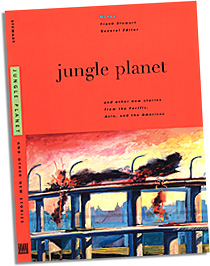Authors cross cultures
with human touch
Stories from around the Pacific
skillfully explore a classic theme
As a body of cross-cultural works, "Jungle Planet and Other New Stories from the Pacific, Asia and the Americas" is hardly unique. This collection of short stories -- the latest offering from the Pacific literary journal Manoa -- touches upon that eternal struggle to bridge one's own reality with that of another. Such a theme is expected of this type of work. What makes "Jungle Planet" stand tall, however, is the quality of its storytelling.
 "Jungle Planet and Other New Stories from the Pacific, Asia and the Americas."General editor Frank Stewart; guest editors Bruce Fulton, Eric Gamalinda, Leigh Saffold, Arthur Sze and John Whalen-Bridge
(University of Hawaii Press,
|
This collection plays with the idea of cultural bridges and what happens when they are crossed -- or not. Always, the decision of whether to make that crossing is a decision on whether to exercise humanity. The processes of deciding fill the pages of "Jungle Plane" with tales of cultural blindness, struggle, destruction and love.
HUZIR Sulaiman's play "Occupation" offers readers an almost surreal perspective of a life experienced through rose-colored glasses. The setting is Singapore during the Japanese occupation, and the main story line is the life of Mrs. Siraj, a woman born into a wealthy, influential family. The play is a recollection of her courtship with her husband, a highly respected, ambitious yet humble scholar.
While being interviewed by a young woman, Mrs. Siraj describes being locked in her mansion with her family and servants when the Japanese invade. She describes rooms full of hidden food and talks of hiding family treasures and jewelry. Mrs. Siraj spends years in hiding, playing mahjong and passing notes to her future husband via servants.
"Her occupation: loving, being loved -- her days of whimsy and confinement, courier cooks, and rooms of food," her interviewer says in frustration. "I want to shout at her, 'Where is the horror?'"
But in the case of Mrs. Siraj, ignorance is bliss.
The characters of "Friends," a tale set in Nepal by Manjushree Thapa, could use a few glimpses from Mrs. Siraj's rose-colored glasses. The two men -- a dissatisfied Nepali named Kamal and Rishikesh, a Nepali whose family emigrated to the United States -- find every day a struggle. Each man has his own challenges with the culture -- one in trying to break in, the other in trying to break free. Both cultural misfits, they find inspiration and comfort in each other.

In addition to featuring short-story fiction, "Jungle Planet" also includes paintings from "Chicano Visions: American Painters on the Verge," a 2001 traveling exhibition of works by leading Chicano artists. At left is John Valadez's "Pool Party."
Meanwhile, Rishikesh, back in Nepal to discover his roots, is despised by his colleagues and deemed a spoiled American boy who plays at being Nepali. Full of ideals and Eastern philosophy, he humbly tries to fit in, to find his place in the country of his heritage. Slowly, he comes to realize he might not have one.
Kamal and Rishikesh are groping for a cultural bridge that proves ever elusive.
Lysley Tenorio's "The Brothers" is a straightforward tragedy told through the eyes of a California man who struggles with his dead brother's transsexuality. The story references the destructive nature of stereotypes; in this case, the mass media's flamboyant, reality-talk-show treatment of the transsexual community. Then it begins to fill out that shallow depiction with a full-bodied portrayal of Eric, the dead brother, and the slow, agonizing evolution of Edmond, who shunned him. Tragedy infuses "Brothers" on various levels: the death of Eric, and the fact that Edmond's acknowledgment of his brother's humanity comes too late.
"Marriage Among the Believers: A Love Story," by David Borofk, is a ray of sunshine in an otherwise gloomy collection: It illustrates the transcendental quality of love. The story is set in a 1960s religious commune, in which a teacher and a teenage girl are paired by the group's religious leader. Their journey in growing a relationship is uplifting and has the reader rooting for the couple.
Of special interest to local readers are the contributions from Mark Panek and James D. Houston with Eddie Kamae, who submit excerpts from their books, "Gaijin Yokozuna: A Biography of Chad Rowan" and "Hawaiian Son: The Life and Music of Eddie Kamae."
Panek's excerpt gives readers a vivid peek at the foreigner's experience in the tradition-entrenched world of sumo. Rowan's trials from the perspective of a local boy make for empathetic, engaging reading and intensify the sweetness of his success. Kamae's offering pulls the reader alongside the musician as he journeys through the Big Island with an iconic, elderly songwriter who instills in Kamae the spirit of Hawaiian music -- and being Hawaiian.
IN HIS editor's note, Manoa's Frank Stewart writes: "It has been said that with the increasing use of the Internet and high-speed travel, no place on Earth is remote anymore; however, remoteness is not merely a question of geographical proximity. We are still blind to everything we choose not to see, deaf to voices we refuse to hear, and uncomprehending of cultures we are incapable of embracing with our imaginations -- no matter how nearby or far away they may be."
Stewart and his guest editors did their work well. The collection makes it impossible for the reader to stay blind, deaf and uncomprehending of other perspectives. The suffering, yearning, dreaming and love they so eloquently convey are, after all, universal human experiences. For that, as well as the elevated quality of its writing, "Jungle Planet" illuminates.
E-mail to Features Desk
[News] [Business] [Features] [Sports] [Editorial] [Do It Electric!]
[Classified Ads] [Search] [Subscribe] [Info] [Letter to Editor]
[Feedback]
